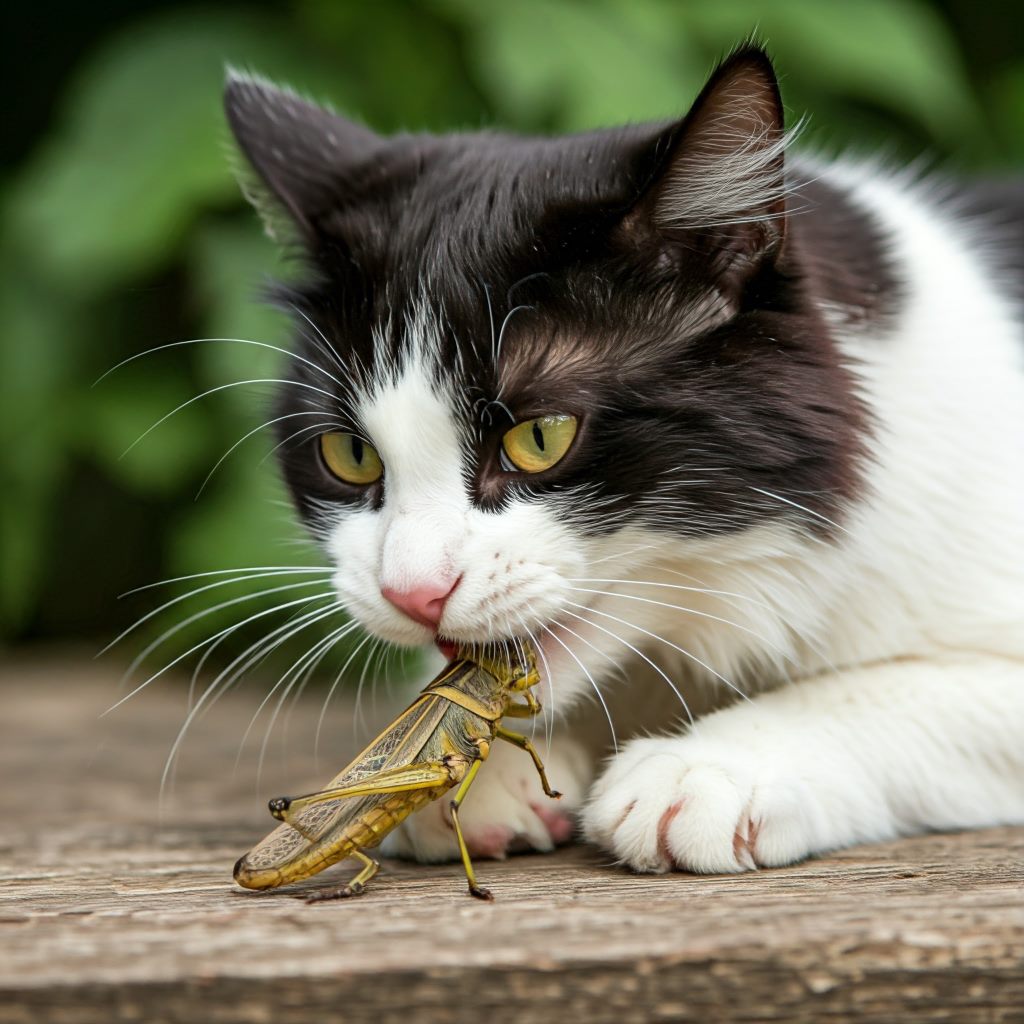
Yes, they do. But how many and what kinds?
Cats are carnivores, which means they need to eat meat in order to live a healthy life. Meat-based cat food is designed to provide the nutrients that cats need, but it doesn’t contain the protein needed to make them healthy.
This is where bugs come in! Bug-based pet food provides all the protein that your cat needs, and it’s much cheaper than kibble or canned food too! Cat owners can feed their pets bugs by mixing them into their regular diet.
Cats are carnivores and will eat meat, but they also like to nibble on bugs and bugs are full of protein. Cats love to chew on things, especially if it’s their favorite toy or a piece of rawhide, but the majority of what they eat is preyed upon by other animals.
If you live in an area where there are plenty of insects, your cat may have no problem eating them. However, if you live in a place where there aren’t many insects around, your cat probably won’t be able to get enough food from eating bugs alone.
The best way for cats to get enough protein without having to hunt down insects is by feeding them canned cat food that contains dehydrated chicken or other animal products. You can also feed your cats cooked chicken or beef broth mixed with canned tuna fish or salmon as treats occasionally.
Do Cats Eat Cockroaches?
Cats are natural predators of cockroaches, and they will eat them. However, this is not something that you should encourage your cat to do. While they might enjoy the taste of cockroaches, they could also have an adverse reaction to it.
Cats have a very sensitive digestive system, so the presence of toxins in their food can make them sick or even kill them. Cockroach flour is high in chitin, which is an insect protein that has toxic properties.
Cats can’t digest chitin well at all, so if they eat cockroaches with chitin-laden saliva, it could be dangerous for them.
Cats also like to eat live cockroaches as well, but this can be dangerous because they can carry diseases that can be deadly to humans if they are not treated properly.
It’s best to keep pets and insects as far apart as possible because there could be health risks involved for both parties if they get too close together.
Can Cats Get Worms From Eating Bugs?
Cats can catch worms from eating insects, including crickets and beetles. Some studies show that cats are more likely to become infected with roundworms from eating beetle larvae than from eating crickets.
Cats can also get tapeworms from eating bugs, but they’re less common. In one study, only 11 percent of cats showed signs of tapeworm infection after eating beetles or crickets. Cats that ate only beetles didn’t have any problems, either.
Cats usually don’t eat enough of the bugs to become infected with these parasites. However, if your cat catches a worm while eating an insect that’s infected with a parasite, he may still get sick and experience symptoms similar to those you would see in humans who have parasites in their intestines.
Your cats might be the best in the world at catching bugs, but they’re not immune to worms.
A worm infestation can be a big problem for your cat, especially if it’s a repeat problem. Worms are very common in cats and dogs, but they’re not always easy to find or diagnose.
Many people think that cats can’t get worms from eating bugs. But this isn’t true! Cats can eat bugs and still suffer from a worm infestation.
Do Cats Eat Crickets?
Yes, cats do eat crickets. While they are not a great source of nutrition, they do provide your cat with protein and can be a great supplement to their diet.
A cat may also try to catch a cricket that has been injured or sick. If you want to discourage your cat from eating crickets, put them in a container with fresh water rather than letting them out of the house in an area where they can escape into your yard or garden.
Cats prefer to hunt ground-dwelling prey than flying insects. Some cats might like to eat crickets because they look like mice or other small prey.
Cats are carnivores and need meat in their diet for proper growth and development. Crickets are a good source of protein for cats, especially if you feed them on a regular basis.
Cats will eat just about anything if it tastes good enough for them! If you want to prevent your cat from eating his or her cricket bait, keep it out of sight until it’s time for your cat’s next meal.
Can Cats Smell Spiders?
Cats can smell spiders, but they don’t always want to eat them.
You might be surprised to learn that your cat can smell a spider. Cats have a keen sense of smell, and they will react to any perceived threat by becoming more alert and displaying their claws.
Cats are naturally drawn to the smell of spiders because they see them as prey. They may even chase the spider with their mouth wide open in an attempt to bite it.
However, cats can also avoid eating spiders if they know that you are allergic to them or if you don’t want them to eat them.
Cats are certainly smart enough to be wary of spiders. They may even try to avoid them if they see one. But it’s possible that they can smell spiders without seeing them.
Cats have excellent sense of smell, and can detect airborne particles such as those released by a spider’s body as it moves around its web.
If you have a cat who likes to climb on things, he may be able to smell the spider even though he cannot see it.
Why Do Cats Like to Eat Insects?
Cats love to eat insects. Insects are a great source of protein, which is why cats like to eat them so much.
Cats are carnivores, which means that they need a high amount of protein in their diet.
Cats also like to eat insects because they are similar to the cat’s diet. Insects are protein rich and contain many vitamins, minerals and other nutrients that cats need in order to be healthy.
A cat needs about 10 percent of its calories from protein. From an evolutionary perspective, it makes sense for cats to eat insects since insects are abundant and easy to catch.
Cats have been predators for millions of years and have evolved to be able to catch and eat anything with their powerful jaws and sharp teeth. In fact, some experts believe that cats may have evolved from small wildcats that hunted prey such as rodents.
Cats are also very active hunters, so they will often hunt along the edges of forests or grasslands where they can easily spot prey such as mice and rabbits.
Do Cats Eat Mice or Just Kill Them?
Cats eat mice, or they kill them. Cats live in a world of competition for food and territory, so a mouse is a potential competitor for the same resources.
Cats are opportunistic carnivores that will eat virtually anything that moves. Mice are relatively small, so if you have a mouse problem in your house, you’ll probably see your cat do more than just kill it.
Mice are not a natural food source for cats and can cause serious health problems for cats if eaten in large numbers or on an ongoing basis.
Cats will eat any small animal that moves too close to their territory. The cat’s instinct is to chase and kill the creature, which may include the mouse or other small animals such as birds and insects.
Cats have a very keen sense of smell and can detect the scent of these creatures. They are also well equipped with sharp claws, teeth and fangs for this purpose. A cat may even go after a bird if it sees one in its territory.
Cat prey includes birds, frogs, lizards and snakes. Some cats will even hunt for rabbits in addition to smaller animals such as mice, rats and squirrels.
What Happens if a Cat Eats a Bug?
If you’re a cat owner, you probably know that your pet is an enthusiastic eater. He will happily snack on his food, but he also likes to keep his options open. If he finds something that looks tasty, he’ll eat it — and if it doesn’t taste great, he’ll toss it aside and go back for more.
But what happens if a cat eats a bug? Is it safe?
The short answer: It depends on what kind of bug it was.
If your cat ate a housefly or grasshopper, there’s little risk that she’ll have any negative effects from ingesting these creatures. In fact, most insects don’t cause any problems at all when they’re eaten by cats.
If your cat eats a bug, it’s not likely to make you sick. Cats can’t eat enough of them to cause illness.
However, if your cat has eaten something that contained pesticides or anticoagulants (like rat poison or warfarin), there’s a good chance that she could experience some side effects from eating them herself — especially if those pesticides were sprayed within the last few days before the cat ate them.

